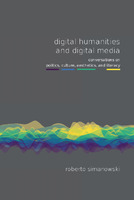Digital Humanities and Digital Media: Conversations on Politics, Culture, Aesthetics and Literacy
Contributor(s)
Simanowski, Roberto (editor)
Language
EnglishAbstract
There is no doubt that we live in exciting times: Ours is the age of many ‘silent revolutions’ triggered by startups and research labs of big IT companies; revolutions that quietly and profoundly alter the world we live in. Another ten or five years, and self-tracking will be as normal and inevitable as having a Facebook account or a mobile phone. Our bodies, hooked to wearable devices sitting directly at or beneath the skin, will constantly transmit data to the big aggregation in the cloud. Permanent recording and automatic sharing will provide unabridged memory, both shareable and analyzable. The digitization of everything will allow for comprehensive quantification; predictive analytics and algorithmic regulation will prove themselves effective and indispensable ways to govern modern mass society. Given such prospects, it is neither too early to speculate on the possible futures of digital media nor too soon to remember how we expected it to develop ten, or twenty years ago. The observations shared in this book take the form of conversations about digital media and culture centered around four distinct thematic fields: politics and government, algorithm and censorship, art and aesthetics, as well as media literacy and education. Among the keywords discussed are: data mining, algorithmic regulation, sharing culture, filter bubble, distant reading, power browsing, deep attention, transparent reader, interactive art, participatory culture. The interviewees (mostly from the US, but also from France, Brazil, and Denmark) were given a set of common questions as well specific inquiries tailored to their individual areas of interest and expertise. As a result, the book both identifies different takes on the same issues and enables a diversity of perspectives when it comes to the interviewees’ particular concerns.
Among the questions offered to everybody were: What is your favored neologism of digital media culture? If you could go back in history of new media and digital culture in order to prevent something from happening or somebody from doing something, what or who would it be? If you were a minister of education, what would you do about media literacy? What is the economic and political force of personalization and transparency in digital media and what is its personal and cultural cost? Other recurrent questions address the relationship between cyberspace and government, the Googlization, quantification and customization of everything, and the culture of sharing and transparency. The section on art and aesthetics evaluates the former hopes for hypertext and hyperfiction, the political facet of digital art, the transition from the “passive” to “active” and from “social” to “transparent reading”; the section on media literacy discusses the loss of deep reading, the prospect of “distant reading” and “algorithmic criticism” as well as the response of the university to the upheaval of new media and the expectations or misgivings towards the rise of the Digital Humanities.
Keywords
transparent reader; algorithmic regulation; participatory culture; distant reading; digital humanities; culture; interactive art; politics; digital media; literacy; deep attention; sharing culture; silent revolutions; data mining; power browsing; digitization; filter bubble; aesthetics; Google; InternetDOI
10.26530/OAPEN_612791ISBN
9781785420313OCN
961469382Publisher
Open Humanities PressPublication date and place
2016Series
Fibreculture Books,Classification
History
Cultural studies
Media studies


 Download
Download Web Shop
Web Shop